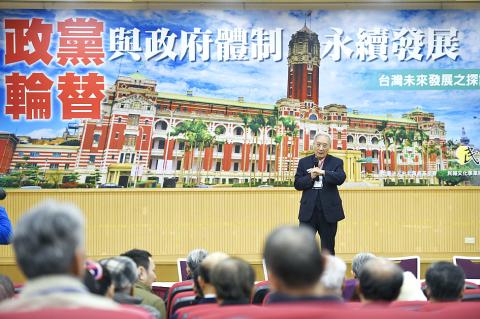Having won the presidential election and achieved its first ever absolute majority in the Legislative Yuan, the Democratic Progressive Party (DPP) should seek to utilize its administrative and legislative resources to implement transitional justice and deepen the nation’s democratic system, Foundation for Asia-Pacific Development president Kang Ning-hsiang (康寧祥) said at a forum the foundation held in Taipei yesterday.
Academics also called on the DPP to prioritize the effort to deal with the issue of the Chinese Nationalist Party’s (KMT) assets and establish a protocol for the transfer of power between different parties.
Without a democratic system, the good life would disappear, Kang said at the forum, which was held to discuss issues relating to sustainable development of governmental systems following the transfer of power.

Photo: George Tsorng, Taipei Times
The nation’s lack of economic success in recent years was the result of the overtly China-friendly policies of the KMT government under President Ma Ying-jeou (馬英九), Kang said, adding that while some Taiwanese have made money, they are now paying the price for the economy being too reliant on China.
President-elect Tsai Ing-wen (蔡英文) must prioritize the KMT’s party asset issue, “which is a national concern as it involves Japanese-colonial era assets, and implement full-fledged transitional justice,” National Taipei University (NTU) Department of Public Administration and Policy professor Chen Yaw-shyang (陳耀祥) said.
Chen cited Germany as an example of successful transitional justice policies, saying that over the past 15 years, Germany has processed all the controversial events that took place in former East Germany, adding that the resolution of such issues is necessary to deepen democracy in Taiwan.
The Legislative Yuan needs to be more transparent and open with its procedures and release of information to prevent the abuse of power and governmental corruption, Chen said, adding that governmental committees should be open for citizens to attend and a special broadcast service to view ongoing meetings at the legislature should be implemented.
“As opposed to the Ma administration’s opaque negotiations, the [new] government must pass a cross-strait accords oversight act so governmental dealings with China are entirely transparent,” Chen said.
Identifying with China is like a recurring rash on a body that is weak and the DPP should make identification with Taiwan a priority, National Dong Hwa University College of Indigenous Studies professor Shih Cheng-feng (施正峰) said.
Taiwan Brain Trust member Lee Ming-chun (李明峻) said the DPP must institute a legal process for the turning over of power between political parties.
Lee pointed to the US’ Presidential Transition Act as an example, which allocates several million US dollars to be used by the outgoing president and the president-elect to facilitate the handover process, adding that in France, once the new president is proclaimed, the handover must occur within 10 days.
The French government sees the handover of nuclear launch codes as the signifier that presidential authority has been passed to the next administration, Lee said, adding that Taiwan should also formulate some legal basis for the transition of power.

Intelligence agents have recorded 510,000 instances of “controversial information” being spread online by the Chinese Communist Party (CCP) so far this year, the National Security Bureau (NSB) said in a report yesterday, as it warned of artificial intelligence (AI) being employed to generate destabilizing misinformation. The bureau submitted a written report to the Legislative Yuan in preparation for National Security Bureau Director-General Tsai Ming-yen’s (蔡明彥) appearance before the Foreign Affairs and National Defense Committee today. The CCP has been using cognitive warfare to divide Taiwanese society by commenting on controversial issues such as Taiwan Semiconductor Manufacturing Co’s (TSMC, 台積電) investments in the

INVESTIGATION: The case is the latest instance of a DPP figure being implicated in an espionage network accused of allegedly leaking information to Chinese intelligence Democratic Progressive Party (DPP) member Ho Jen-chieh (何仁傑) was detained and held incommunicado yesterday on suspicion of spying for China during his tenure as assistant to then-minister of foreign affairs Joseph Wu (吳釗燮). The Taipei District Prosecutors’ Office said Ho was implicated during its investigation into alleged spying activities by former Presidential Office consultant Wu Shang-yu (吳尚雨). Prosecutors said there is reason to believe Ho breached the National Security Act (國家安全法) by leaking classified Ministry of Foreign Affairs information to Chinese intelligence. Following interrogation, prosecutors petitioned the Taipei District Court to detain Ho, citing concerns over potential collusion or tampering of evidence. The

‘COMPREHENSIVE PLAN’: Lin Chia-lung said that the government was ready to talk about a variety of issues, including investment in and purchases from the US The National Stabilization Fund (NSF) yesterday announced that it would step in to staunch stock market losses for the ninth time in the nation’s history. An NSF board meeting, originally scheduled for Monday next week, was moved to yesterday after stocks plummeted in the wake of US President Donald Trump’s announcement of 32 percent tariffs on Taiwan on Wednesday last week. Board members voted to support the stock market with the NT$500 billion (US$15.15 billion) fund, with injections of funds to begin as soon as today. The NSF in 2000 injected NT$120 billion to stabilize stocks, the most ever. The lowest amount it

NEGOTIATIONS: Taiwan has good relations with Washington and the outlook for the negotiations looks promising, Minister of Economic Affairs J.W. Kuo said Taiwan’s GDP growth this year is expected to decrease by 0.43 to 1.61 percentage points due to the effects of US tariffs, National Development Council (NDC) Minister Paul Liu (劉鏡清) said at a meeting of the legislature’s Economics Committee in Taipei yesterday, citing a preliminary estimate by a private research institution. Taiwan’s economy would be significantly affected by the 32 percent “reciprocal” tariffs slapped by the US, which took effect yesterday, Liu said, adding that GDP growth could fall below 3 percent and potentially even dip below 2 percent to 1.53 percent this year. The council has commissioned another institution